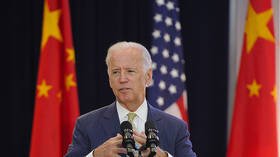Twitter steps up political censorship with Facebook-like labels for election announcements from non-mainstream media accounts
Twitter has unveiled a new label for Election Day announcements that don’t come from “official sources” – a category including not just election authorities, but national news outlets that frequently get stories wrong.
From Tuesday through Inauguration Day – over two months – Twitter will slap a ‘disputed’ label on “some Tweets that make claims about election results,” the platform announced on its blog on Monday. Election-related tweets from any candidate running in 2020 and their campaigns, along with US-based accounts with over 100,000 followers, risk incurring the punitive labels, as does any tweet with over 25,000 likes or retweets.
We may label Tweets, starting on election night, that make claims about election results before they’re officially called.We’ll be prioritizing the presidential election and other highly contested races where there may be significant issues with misleading information. pic.twitter.com/BExhZdVMnB
— Twitter Support (@TwitterSupport) November 2, 2020
The alert shows up as a blue exclamation point and a warning that “official sources may not have called the race when this was tweeted” or “official sources called this election differently,” depending on the outcome. Attempting to retweet the offending material enlarges the warning, adding a button so the user can “find out more” about how to “help keep Twitter a place for reliable info.”
Labeled tweets cannot be retweeted, liked, or replied to, only quote-tweeted. The platform has cracked down on users’ ability to retweet anything over the past month in what it claims is an effort to stop the spread of misinformation by forcing users to consider why they’re sharing a particular post, incensing non-US users who resent having to curtail their own retweeting for an election that means nothing to them.
Not all accounts will be subject to the indignity of the warning labels. “Official sources” will be permitted to post what they like about the election without fear of censorship. Twitter has clearly delineated which accounts will receive this privilege: in addition to state election officials, ABC News, Associated Press, CBS News, CNN, Fox News, NBC News, and Decision Desk HQ (a platform that reports election results) will be able to discuss those results.
While concerned voters might note that many of those news organizations are notorious for getting political stories wrong, those who fear a digital “Dewey Defeats Truman” need not be concerned – Twitter wrote in its post that it picked those organizations for their “dedicated, independent election decision desks.” Those desks don’t seem to have Twitter accounts separate from the main news organization, however.
The labels are only the latest development in Twitter’s lengthy track record of chipping away at users’ speech. The 2020 campaign season has seen the platform slap “misleading” and “disputed” warnings on content that does not conform to the prevailing narrative, whether it’s a tweet from White House medical adviser Scott Atlas questioning the effectiveness of mask mandates or a tweet from President Donald Trump questioning the integrity of mail-in voting. A bizarre attempt to “pre-bunk” voting-related disinformation was also rolled out last week.
Also on rt.com ‘Election misinformation pre-bunking’? Twitter again censors Trump as it begins spamming Americans with new Orwellian warningsLast month, the platform debuted a “disputed” warning similar to the election-misinformation prompt for users trying to retweet wrongthink, a move which was itself a partial walkback of the blanket ban on sharing a link to the New York Post’s story on the incriminating contents of Democratic scion Hunter Biden’s laptop. The decision was presumably spawned more by self-interest than censorship remorse, as the Republican National Committee had filed a complaint with the Federal Election Commission charging Twitter’s latest attempt to (supposedly) prevent election meddling had in fact meddled in the election on behalf of the Biden campaign.
The platform’s efforts to micromanage the narrative have driven Trump, himself an enthusiastic Twitter user, into a frenzy, leading him to repeatedly threaten to repeal social media platforms’ Section 230 legal liability protection.
Like this story? Share it with a friend!














